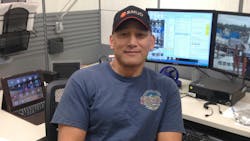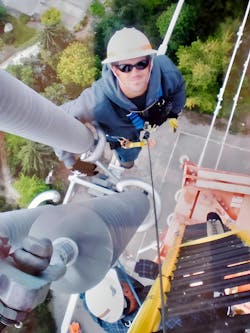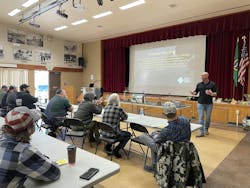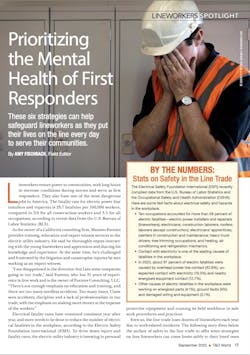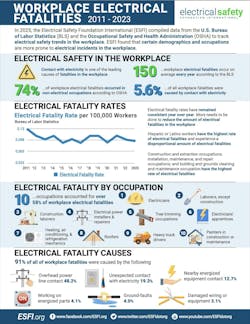Prioritizing the Mental Health of First Responders
Listen to a Narrated Version of This Story in the ICYMI Series for the Line Life Podcast
The T&D World Line Life Podcast, which celebrates lineworkers' grit, inspirational teamwork and determination, featured a three-part series on how to break the silence and change the culture of mental health in the line trade. Listen at llinelife.podbean.com or by clicking on the links below.
Lineworkers restore power to communities, work long hours in extreme conditions during storms and serve as first responders. They also have one of the most dangerous jobs in America. The fatality rate for electric power line installers and repairers is 23.7 fatalities per 100,000 workers, compared to 9.6 for all construction workers and 3.5 for all occupations, according to recent data from the U.S. Bureau of Labor Statistics (BLS).
As the owner of a California consulting firm, Maximo Fuentes provides training, education and expert witness services to the electric utility industry. He said he thoroughly enjoys interacting with the young lineworkers and apprentices and sharing his knowledge and experience. At the same time, he’s challenged and frustrated by the litigation and catastrophic injuries he sees working as an expert witness.
“I am disappointed in the direction that I see some companies going in our trade,” said Fuentes, who has 31 years of experience in line work and is the owner of Fuentes Consulting, LLC. “There’s not enough emphasis on education and training, and there are too many needless accidents. Too many times, I have seen accidents, discipline and a lack of professionalism in our trade, with the emphasis on making more money at the expense of the workers.”
Electrical fatality rates have remained consistent year after year, and more needs to be done to reduce the number of electrical fatalities in the workplace, according to the Electric Safety Foundation International (ESFI). To drive down injury and fatality rates, the electric utility industry is investing in personal protective equipment and training its field workforce in safe work procedures and practices.
Even so, the line trade loses dozens of lineworkers each year due to work-related incidents. The following story dives beneath the surface of safety in the line trade to offer some strategies on how lineworkers can come home safely to their loved ones each night and handle the stress of working as first responders in their communities.
-
Understand the Toll of Trauma in the Line Trade.
As the electric utility industry continues to grow, evolve and expand, safety is always top of mind in the line trade. Even so, from the early years of line work to today, the industry has suffered from many accidents and learned lessons learned from them, said Randy Beckes, a journeyman lineworker who founded Utilitrain, a pre-apprenticeship training program in Maryland.
“Over the years of hard work and training, I have seen a number of linemen, some close friends, seriously injured from accidents,” said Beckes, who started out in the line trade in 1977. “This drew me deeper into my commitment for safety and safety training.”
Lineworkers — whether they have just started in the trade or are nearing retirement — may one day experience a near-miss or the loss of a beloved coworker, and the toll can be complete self-destruction, said Ken Lulow, a journeyman lineworker and president of Line Worker Solutions.
“The guilt, the fear and the pain are crippling,” Lulow said. “Without proper care and support, it could lead to self-destructive behavior that can ruin their lives and have catastrophic effects on all those around them — peers, family, children and friends. Don’t try to self-cope and hold it all in. Share your struggles and find the support that is needed.”
A near-miss, or loss of a close co-worker, can be more difficult than being the victim yourself, in some ways, said Jon Backman, a journeyman lineworker with 25 years in the industry.
“Watching a serious accident is a traumatic experience, especially if the victim is someone you know well,” Backman said. “The early and unexpected loss of a close person in your life is incredibly difficult to deal with, as you may be left feeling like you never had a chance to tell that person certain things before they were gone.”
Backman said he has only had one close experience with losing a co-worker due to an on-the-job accident.
“I was an apprentice at the time, and he was a more senior employee with a great reputation and safe work habits,” he said. “The biggest takeaway for me was seeing the heartfelt reaction from all the employees at the utility and the community we served.”
Danny Raines, the author of the book, Legends of an Old Lineman and owner and senior consultant of Raines Safety Solutions LLC in Griffin, Georgia, said a near miss can be a learning experience caused by a distraction or a loss of focus and may or may not cause severe injury. Often, a thorough investigation of the near miss will identify the procedures that were not followed, which could have prevented the incident. A fatality, however, is something that will impact not only the fallen lineworkers and their families, but also everyone on the crew and at the company.
“A loss of life is a traumatic event with far-reaching, severe outcomes to all employees associated with the event and is very difficult to get over,” Raines said. “A thorough root cause analysis investigation must be implemented to prevent anything like that from happening again.”
Over his 58 years in the industry, Raines has seen utilities and contractors provide additional resources related to mental health, as well as tools and equipment to make the job safer.
“This prioritizes the importance and increases the awareness of doing the job correctly,” said Raines, who provides OSHA authorized training and skills training covering distribution coverup, system grounding and accident prevention and investigation.
-
Provide Support in the Aftermath of a Tragedy, Near-Miss or Loss.
To help the field employees heal from the tragedy of a lineworker fatality, utilities can bring in a therapist or a specialist to provide information as to why and how the accident occurred, Raines said.
For example, Union Care Solutions, a 501(c)(3) organization, is helping support mental health and peer support across the industry and creating awareness about critical incident response and suicide prevention. In the aftermath of a fatality, the Critical Incident Stress Management (CISM) teams can provide “psychological First Aid” through debriefings, defusing sessions, crisis intervention and crisis management briefing.
“Critical incident stress management is crucial to address the emotional and mental well-being of workers who may be exposed to traumatic events or stressful situations,” according to UCS. “The timely deployment of a CISM team can help mitigate the psychological impact of critical incidents, support workers in coping with stress and promote a culture of mental health awareness and support among the crew, and within the company, and ultimately throughout the industry.”
Advocates like Jenny Lavin, the president and founder of UCS, along with utilities, unions and contractors, are making significant strides in improving the lives of lineworkers by prioritizing mental health and wellness, said David Mendonca, the executive director of the Show Up Dad Foundation, an organization started in 2020 that helps young men with their mental health, marital, parenting issues.
“This collective effort not only enhances overall safety but also ensures that lineworkers return home to their loved ones each night, fostering a healthier and more resilient workforce,” said Mendonca, moderator of the Show Up Dad podcast, pastor, father and journeyman lineworker in Elsinore, California. “A supportive environment encourages open communication about mental health, reducing stigma and promoting a culture where workers feel comfortable discussing their struggles.”
Over the years, utility companies have implemented safety culture initiatives, which can decrease stress and improve mental health for lineworkers, Mendonca said. By addressing mental health proactively, lineworkers are less likely to experience burnout or fatigue, which can impair judgment and increase the risk of accidents, he said.
“Improved mental well-being allows lineworkers to concentrate better on their tasks, leading to safer work practices and decision-making,” he said. “Training and support also help workers develop resilience, enabling them to cope with challenges and stressors more effectively. In addition, peer support and community-building initiatives enhance teamwork, creating a network of support that can help workers look out for one another and prioritize safety.”
Listen to an Interview with Jenny Lavin about Safeguarding Mental Health in the LIne Trade
Tune in to Part 2 of the Series Featuring Jenny Lavin
Three Ways to Break the Silence on Mental Health Struggles
In their roles as first responders, lineworkers may have a hard time prioritizing their health aand wellness following a traumatic event or after dealing with chronic stress and anxiety. Instead of burying emotions deep inside, here are a few ways lineworkers can connect with others and take charge of their mental health.
- Look out for each other and ask for help. “Embrace vulnerability and share your stories and experiences with your peers,” said Ken Lulow, president of Line Worker Solutions. “Let others know that it’s okay to not have the answers, and it’s okay to not be okay. Share your knowledge, ask when you don’t know something and don’t turn your back on your peers because you’re afraid to ask how they are. Be accountable and courageous to ask questions.”
- Keep the lines of communication open. “I would suggest finding a co-worker you are comfortable with, and have open, honest conversations,” said Journeyman Lineworker Jon Backman. “The cab of a truck is a great place to have these private trust-based chats.”
- Turn to professional help. Therapists such as Valerie Guile at Buffalo Roam Therapy Group in Overland Park, Kansas, (www.buffaloroamtherapy.com/valerie-guile) are trained in trauma response and helping first responders to heal following crisis situations.
Jon Backman is a troubleman in the Pacific Northwest. Listen to his story by tuning in to the Line Life Podcast or reading Lineworker Focus.
Listen to Part 3 of the Line Life Podcast Series on Mental Health in the Line Trade for Tips and Resources
-
Shift the Culture to Focus on Mental Health, Wellness and Support.
Traditionally, the line trade hasn’t emphasized emotional health and wellness, but as the stigma of getting help has decreased nationwide, it is no longer uncomfortable to acknowledge struggles or stresses, and that’s important to build on, Backman said.
“Many of us face similar challenges, and it helps to talk to other people who are in the same work and life situation,” he said. “You may not get solutions or answers, but it is reassuring to know you aren't the only one dealing with stress.”
Backman said it takes time to truly have a meaningful impact on mental health and wellness.
“Creating and maintaining a workplace culture of trust, transparency and support is the most effective method,” he said. “This can’t be done virtually. It takes time, dedication and financial investment. Oftentimes, short-term goals eclipse the need for this culture development, but if utilities are willing to provide a secure environment, the employees will feel more relaxed and comfortable at work.”
While technology has led to improved opportunities in many ways, Backman said it’s vital to keep in-person training and learning as the core foundation of improvement for electrical workers.
“We still work side-by-side in the field, and our working relationships rely on trust,” he said.
Lulow, who serves as an advocate for frontline workers and leads training and culture-building programs that empower utility workers, said that in his time in the line trade, he hasn’t seen the level of care needed to support the mental health and wellness of field employees. While the tools are available and many organizations have good intentions, they haven’t asked the right question: What can we do to support you and where you’re at?
“Because of this, our industry continues to decline,” Lulow said. “No matter how many resources we throw at the problem, it will never solve this issue until we create a psychologically safe workplace and treat people like people. I have sat in many conferences and other discussions where workers are seen and treated like a resource that can just be pulled off the shelf from the local hardware store — like they are a box of screws — especially when it comes to mutual aid workers following a storm. We must treat our lineworkers like people, recognize that they have families, real lives and the same struggles we have — not as just a resource to get the lights on when the storm hits.”
He said it’s human behavior to act according to how you’re treated.
“There isn’t a quick fix for this, and no matter how many safety policies we implement, I don’t see the accidents decreasing unless we shift the culture,” he said. “There is more than enough data available supporting the benefits of psychological safety and shifting the culture. Some utilities with courageous leaders are already embracing this, but unfortunately, most others are still relatively unaware or satisfied with the status quo. I wholeheartedly believe this shift will change the industry; it’s just going to take time to catch on.”
-
Emphasize Safety — Not Just Productivity — in the Field.
As the line trade continues to feel the pressure to do more work in less time, safety often takes a backseat in the field. For example, frontline leaders may tell the lineworkers how to stay safe in extreme heat by following the rules they set — drink water, take breaks and set up shade, yet they did little to enable them to truly adhere to these rules in the actual condition of the field. At the same time, they say “safety first,” yet they may advise lineworkers to get the job done as quickly as possible because it’s a “hard-money job.
“The last thing the crew heard was ‘hurry up,’ Lulow said. “This message leaves the crew feeling that the boss really cares about speed — not safety — and human behavior and fear of job security will have the crew cutting safety concerns to ‘hurry up.’ The guys are going to get the job done — it’s who they are.”
If an accident happens, and the investigation reveals that safety protocols were not followed, Lulow said, human error will be to blame.
“If it’s found that ‘the crew disobeyed safety protocols,’ we tend to reactively set new safety rules to prevent this mistake,” he said. “We are only treating symptoms when we do this. What’s the real reason the crew felt like they couldn’t follow safety protocol? Does the frontline supervisor take responsibility for pressuring them to speed up?”
By taking a different approach, utilities and their field workforce could get a completely different result. For example, the human error may be due to a lack of training, a toxic work environment or chronic dehydration, which could contribute to cognitive decline with slow reaction time or tunnel vision.
“Honestly, this happens more than we think,” Lulow said. “Eighty percent of Americans are already dehydrated, and we create high-stress environments for lineworkers where their cortisol levels are at extreme highs. They cope by drinking alcohol after work — further dehydrating themselves — and then they’re right back out to work again on the same cycle.”
Because lineworkers are needed to perform the job, many companies turn a blind eye and don’t take accountability for putting lineworkers in a losing situation. For example, lineworkers are required to wear arc-rated PPE to protect themselves from arc-flash burns. In response, some utilities may purchase the least expensive PPE available to check the box, but this may create additional hazards, he said.
“Not all PPE is the same,” Lulow said. “Some is heavy and doesn’t breathe or wick away sweat,” he said. “In high heat, we could be causing our people to overheat or get heat illness. If they remove their PPE, they could get fired. This is a leadership miss — not a field error. If we know the conditions that our people are faced with, asked how could we create better conditions and gave them the ‘why’ behind the ‘how,’ we would be empowering them to mitigate their risk and fewer accidents would happen,” he said.
-
Extinguish Toxic Bravado in the Line Trade.
For decades, lineworkers, especially those new to the trade, may have been reluctant to speak up in an unsafe work environment.
“The old way of control and command is broken,” Lulow said. “This method didn’t work, and never truly did, and we all know it. We are on a plateau, and we’ll drive right off the ledge if we don’t recognize this and change our approach. It’s a people problem, not a safety problem.”
To truly make a difference in improving the safety of lineworkers, it starts with culture. He encouraged apprentices and journeymen lineworkers to be human and identify their purpose — the driving force that gets them out of bed every day.
Years ago, Lulow asked a first-year apprenticeship class to fill out an anonymous poll providing three to five reasons why they chose to be lineworkers. He told them “money” couldn’t be a reason as money is a result of the work, and you can make money from a thousand other occupations.
“I told them that they are treated poorly their first few years, away from their families, struggling to get by, drug all over the country and forced to work obnoxiously long hours in terrible conditions,” he said. “So, I asked them, ‘Why on earth would you choose to be a lineworker? The results were mind-blowing.”
There were three commonalities — a sense of belonging, especially to the union and the brotherhood and sisterhood of the line trade; a sense of helping others and doing something rewarding by getting the lights back on during a power outage or making sure everyone had electricity to keep their life running; and a physical and mental challenge to overcome the odds and test their limits.
“Line work is unique in the sense that it feels special to be a lineworker,” Lulow said. “You are tasked with impossible odds to bring power to others, and the group belonging feel is even further connected by the challenges and obstacles you face with your crew. Risk and miserable conditions bond and connect this group even more.”
He said lineworkers are often unique individuals who may have been told they weren’t good enough for college and to go the trade route, which could cause some subconscious resentment for some.
“Line work provided us with a home where everyone was the same,” he said. “Now we have a group mentality of bonded individuals with a desire to help people and prove the world wrong—a band of misfits treated like outlaws who took on the outlaw persona — and lineworkers loved this label.”
Management, which historically consisted of former field employees, has now been replaced by career office individuals, creating a knowledge gap from the office to the real conditions in the field, Lulow added.
“Technology now allows management to micromanage the field, demand more, and faster, turning lineworkers into a resource,” he said. “Management recognizes production — it’s what drives profits.”
As a result, utilities and contractors often honor the high producers, which has unknowingly caused damaging consequences, he said.
“Many of these high producers are often the individuals who have an ego, have embraced the outlaw label too much and aren’t true leaders,” he said. “They are the individuals who may cut corners for speed, take safety risks and make dangerous decisions to compete for the ‘I’m the best’ title. Organizations promote these people, setting the example to other lineworkers what they should model to get promoted. This has caused a cancerous culture.”
He said it’s time to stop the toxic bravado and embrace psychological safety and accountability. To truly drive down the number of accidents, injuries and fatalities in the line trade, it is going to take a culture reset, he said.
“Reward the individuals who embrace the positive safety cultures and whose mission is building people and not money,” he said. “Recognize the leaders in this industry who champion safety and do what is right. Make this the standard, and the toxic bravado will die out.”
He likened it to a flower garden. If you don’t cultivate it, it will be overrun with weeds (toxic bravado), but if you nurture your flowers (culture champions), you will wind up with a beautiful flower garden. While you may get a weed here and there, you can just pluck it from your garden before it can spread.
“It’s a complex and challenging issue, and it’s a commitment and a journey that must be nurtured, just like a flower garden,” he said.
10 Safety Culture Initiatives to Improve Mental Health and Wellness
Utilities and contractors can change the conversation about mental health by offering resources to their field workforce. Journeyman Lineworker and Mentor David Mendonca shares the following 10 initiatives companies can consider to improve the safety culture at their companies.
Employee Assistance Programs (EAPs): Many utility companies offer EAPs that provide confidential counseling services for employees and their families. These programs can help workers deal with personal issues, stress and mental health challenges.
Mental Health Training: Training programs focused on mental health awareness and resilience can equip workers with tools to recognize signs of stress or mental health issues in themselves and their colleagues.
Wellness Programs: Companies often develop wellness programs that include fitness challenges, mindfulness activities, and health screenings, promoting overall well-being and reducing stress.
Safety Culture Initiatives: Implementing a strong safety culture where mental health is prioritized alongside physical safety fosters an environment where workers feel supported and valued.
Peer Support Programs: Establishing peer support groups allows employees to share experiences and challenges, creating a sense of community and reducing feelings of isolation.
Flexible Work Schedules: Providing options for flexible schedules can help lineworkers manage their work-life balance more effectively, reducing stress and improving overall mental health.
Regular Check-ins: Management can implement regular check-ins to assess employees’ mental health and well-being, demonstrating care and support for their workforce.
Access to Resources: Ensuring that employees have easy access to mental health resources, including hotlines and online tools, can encourage them to seek help when needed.
Provide Training on Stress Management: Workshops on stress management techniques, such as mindfulness, coping strategies and relaxation exercises, can help workers
better handle the pressures of their jobs.
Organize Recognition and Appreciation Programs: Acknowledging and celebrating employee achievements can boost morale and foster a positive work environment, contributing to mental wellness.
Listen to an Interview with David Mendonca from the Show Up Dad Foundation
-
Encourage Apprentices and Experienced Lineworkers to Learn From Each Other.
Culture changes don’t happen overnight. On the path to improved mental health and wellness, however, apprentices can find senior employees, or even other apprentices, who have a reputation for being safe and accident-free, Backman said.
“Watch how they work and pay attention to the decisions they make,” he said. “These established habits build the foundation for a long career without accidents.”
Raines agreed, saying apprentices should learn the rules and regulations, follow the safe work practices and seek advice from more experienced lineworkers, especially in today’s industry, where more responsibilities and accountabilities are placed on the field workforce.
When new apprentices come into the trade, many get caught up in the cycle of a heavy workload and a lot of overtime, Backman said. Instead, they should try to truly embrace work/life balance.
“There is a great deal of pride in lineworkers' dedication, but the effect is cumulative,” Backman said. “You may not feel it yourself, but there are people at home who need you and who rely on you. It's important to give them that time. It's the company's responsibility to adequately staff up for the workload, not the employees'.”
Trying to achieve the perfect balance of life in the field and at home, however, can be nearly impossible for some lineworkers, especially for those new in the field, Mendonca said. For these individuals, it may be better to try to focus on being present in each environment — dedicate themselves to work when they’re on the job and fully engage at home when they’re there.
“If you’re dealing with personal issues at home, consider asking your foreman if you can share your spouse’s or a loved one’s phone number with them,” Mendonca said. “This way, if there’s an urgent need to reach you, they can contact your foreman directly, allowing you to avoid constant distractions and worries about what’s happening at home.”
The challenges with mental health and balance not only apply to apprentices but also to veteran lineworkers with decades of experience in the field. For those nearing retirement, they must avoid complacency to maintain safety in the field, he said.
“Remember that complacency can be dangerous,” he said. “Shift your perspective to consider, ‘What could potentially harm me?’ For every situation, take the time to identify hazards. By doing this, you’ll have a mental plan in place for what could go wrong, which helps you stay prepared. It’s important to share this mindset with the younger generation as well. Always be aware of your surroundings and prioritize safety.”
Raines advised experienced lineworkers to never quit learning and focus on job planning, hazard analysis and following OSHA regulations.
You will never know it all,” Raines said. “Make sure the management team understands regulations, can be the resource the fieldworkers need and monitor the practices in the field.”
Lulow said lineworkers’ legacy isn’t what’s left in the field—it’s the generations that they will influence.
“Give your legacy something to celebrate and be proud of and mentor these next generations,” Lulow added.
Backman encouraged veteran lineworkers to not only continue the tradition of pride in the past but also remain open to learning new things and trying new tools, materials or techniques. He said the line trade is changing more than at any other time in history due to evolving technology, automation, load growth, customer expectations, legislation and other factors.
“While lineworkers are expected to evolve with these changes, we are also expected to have the knowledge and experience to work with a system that is oftentimes decades or centuries old,” he said. “Sometimes you need to listen to and learn from younger or newer employees. Not only will this make us safer lineworkers, but we will also be more efficient and effective, which makes us more valuable to our employers.”’
Safety programs, which are driven by OSHA to educate the workforce, have changed the landscape of how utilities operate, Beckes said.
“We now can not only help those wanting to become linemen, but we’re also helping our electric utilities and contractors that are hiring lineworkers,” Beckes said. “As a result of OSHA standards, new technology and well-trained lineworkers, we are seeing the trend of accidents decrease, yet the job isn’t over. We need to continue to train and educate the electric utility industry to become even better. Safety is our number 1 priority.”
Share This Article At Your Next Tailboard Meeting
Toolbox talks or tailboard meetings often focus on hazards in the field from severe weather conditions to wearing the proper personal protective equipment. The hidden mental health struggles of your crew members, however, may fly under the radar. Consider downloading the article that appeared in the print supplement by clicking on the link to the PDF below or sharing the three-part Line Life Podcast series to safeguard the mental health of your line crews.
Download a PDF of the Article from the 2025 T&D World Lineworker Supplement
Download the Poster from ESFI for Your Next Safety Presentation
In the Aftermath of a Tragedy: Potential Tolls and Coping Strategies
Experiencing a near-miss, accident, or the loss of a close coworker can have profound effects on lineworkers, both emotionally and psychologically, said David Mendoca, a lineworker and executive director of the Show Up Dad Foundation. Here are some impacts of a tragedy as well as coping strategies.
Emotional and Psychological Tolls
-
Shock and disbelief: A near-miss or accident can leave lineworkers in shock, struggling to comprehend what happened and why.
-
Guilt: Survivors of an incident may experience survivor’s guilt, questioning why they were unharmed while others were not.
-
Anxiety and fear: Traumatic events can lead to heightened anxiety, especially concerning safety. Workers may become fearful of returning to similar tasks or environments.
-
Depression: The loss of a coworker can lead to feelings of sadness, loneliness and depression, particularly if there was a close personal connection.
-
Post-Traumatic Stress Disorder (PTSD): Some workers may develop PTSD, characterized by flashbacks, nightmares and severe anxiety related to the traumatic event.
-
Decreased Job Performance: Emotional distress can impact focus and performance, potentially leading to further safety risks.
Coping Strategies
-
Talk about It. Encourage open discussions about the incident among colleagues. Sharing feelings can help process emotions and reduce isolation.
-
Seek professional help. Consider counseling or therapy, especially if symptoms of PTSD or depression arise. Professional support can provide effective coping mechanisms.
-
Join support groups. Engage in support groups where workers can share experiences and coping strategies related to workplace trauma.
-
Focus on safety training. Participate in safety training and discussions to reinforce the importance of safety protocols. This can help regain a sense of control and responsibility.
-
Establish Safety Buddy Systems. Partner with coworkers to create a buddy system that promotes safety awareness and accountability on the job.
-
Practice mindfulness and stress management. Techniques such as meditation, deep breathing or yoga can help manage stress and improve emotional resilience.
-
Memorialize the lost. Create a tribute or memorial for the coworker, which can provide closure and honor their memory.
-
Advocate for safety improvements. Work with management to identify and advocate for safety improvements or changes in protocols that can prevent future incidents.
-
Reflect on lessons learned. Take time to reflect on the incident and identify lessons learned that can enhance personal and workplace safety.
-
Engage in training programs. Participate in or lead training sessions focused on safety practices to help others understand risks and promote a culture of safety. For example, individuals impacted by workplace accidents can reflect on their views of safety and take on mentorship roles. By actively participating in safety training and sharing personal stories, workers can contribute to a safer work environment and support each other in coping with the emotional aftermath of traumatic experiences.
Prioritizing Self-Care in the Line Trade: 12 Tips for Lineworkers
David Mendonca of the Show Up Dad Foundation and host of the Show Up Dad Podcast, offers these self-care strategies for lineworkers. By integrating these techniques into their daily routines, they can enhance their mental health, reduce stress and improve overall well-being.
1. Take regular breaks. Take scheduled breaks during shifts to rest and recharge, even if it's just a few minutes to step away from the work environment.
2. Incorporate mindfulness practices. Techniques such as deep breathing, meditation or yoga into breaks or after work to reduce stress and enhance focus.
3. Focus on physical fitness. Engage in regular physical activity, whether through workouts, walking or stretching. This can help alleviate physical strain and improve overall mental wellness.
4. Engage in healthy eating. Focus on nutrition by preparing healthy meals and snacks ahead of time. Maintaining a balanced diet can boost energy levels and mood.
5. Stay hydrated. Drink plenty of water throughout the day to maintain physical and mental clarity, especially during long hours outdoors.
6. Maintain a work-life balance. Set boundaries between work and personal life. Make time for family, hobbies and activities that bring joy and relaxation.
7. Connect with colleagues. Foster a supportive network among coworkers. Sharing experiences and challenges can help reduce feelings of isolation and create a sense of community.
8. Seek support. If feeling overwhelmed, don’t hesitate to reach out for professional help or counseling services. Many organizations offer Employee Assistance Programs (EAP) that provide mental health resources.
9. Keep a journal to express thoughts and feelings. Writing can be a therapeutic way to process experiences and emotions.
10. Engage in hobbies. Dedicate time to hobbies or interests outside of work. Engaging in enjoyable activities can provide a much-needed mental break.
11. Improve sleep hygiene. Prioritize good sleep habits by maintaining a consistent sleep schedule and creating a relaxing bedtime routine. Quality rest is crucial for mental health.
12. Have positive affirmations. Use positive self-talk and affirmations to boost self-esteem and cultivate a positive mindset. By integrating these self-care practices into their daily routines, electrical lineworkers can enhance their mental health, reduce stress and improve overall well-being.
By the Numbers: Stats on Safety in the Line Trade
The Electrical Safety Foundation International (ESFI) recently compiled data from the U.S. Bureau of Labor Statistics and the Occupational Safety and Health Administration (OSHA). Here are some fast facts about electrical safety and hazards in the workplace.
-
Ten occupations accounted for more than 58 percent of electric fatalities—electric power installers and repairers (lineworkers); electricians; construction laborers; roofers; laborers (except construction); electricians’ apprentices; painters in construction and maintenance; heavy truck drivers; tree trimming occupations; and heating, air conditioning and refrigeration mechanics.
-
Contact with electricity is one of the leading causes of fatalities in the workplace.
-
In 2023, about 91 percent of electric fatalities were caused by overhead power line contact (42.8%), unexpected contact with electricity (19.3%) and nearby energized equipment contact (12.7%).
-
Other causes of electric fatalities in the workplace were working on energized parts (4.1%), ground faults (4%) and damaged wiring and equipment (3.1%).
How to Get Help
Lineworkers are first responders, and due to the danger and nature of their jobs, they may need help and support, especially following a personal near-miss or the fatality of a coworker. Here are some resources for mental health support for the line trade and your families.
-
Call 988: More construction workers die by suicide than all the occupational fatalities combined, according to a study by the American General Contractors of America. If you or someone you know is in crisis, call 988 to reach a national suicide hotline for 24/7 confidential support. You can also chat at 988lifeline.org. Help is just a phone call or chat away.
-
Visit the website for National Alliance on Mental Illness (NAMI): This organization provides support groups, a help line and other support and education at nami.org.
-
Connect with ResponderStrong: You can text the word, “BADGE,” to 741-741 to be connected with a trained crisis counselor. This organization serves those who are trained to serve the community in times of emergency, crisis or disaster.
-
Reach out to Safe Call Now: This 24-hour confidential crisis referral service is for all public safety employees, emergency services personnel and their families nationwide.
-
Learn about PTSD. After experiencing a traumatic event, such as the loss of a crew member or an injury on the job, lineworkers may be at risk for post-traumatic stress disorder (PTSD). Symptoms include, but aren’t limited to flashbacks, nightmares and intrusive thoughts. The National Center for PTSD, available at ptsd.va.gov, offers research, education, videos and apps that can help those with PTSD and their families to learn how to understand the diagnosis and get help and support.
-
Get in touch with a licensed therapist, psychologist or social worker. Psychologytoday.com allows anyone, including lineworkers and their families, to search for free for a mental health professional by location, specializations, gender, language and types of insurance. Visits are often available in-person or virtually to accommodate busy work schedules.
-
Reach out to injured or fallen lineworker organizations. Groups such as the Fallen Linemen Foundation; the Fallen Linemen Organization; the National Sisterhood United for Journeymen Linemen (NSUJL); the National Association of Journeymen Linemen; Line Life Foundation; the Line Brother’s Keeper; the Highline Hero Foundation the MTL Foundation and others can provide emotional, financial and physical assistance to fallen and injured lineworkers and their families.
-
Connect with Union Care Solutions. This organization offers mental health trainings, peer support education and CISM teams to provide support to employees who have been affected by traumatic events in the workplace. Learn more at unioncaresolutions.org or attend Jenny Lavin’s 9:30 to 10:30 a.m. session, “Protection Under the Hard Hat: Mental Health and Safety in the Power Industry,” Oct. 15 at the Overland Park Convention Center as part of the 2025 International Lineman’s Rodeo Safety and Training Conference.
About the Author
Amy Fischbach
Electric Utilities Operations
Amy Fischbach is the Field Editor for T&D World magazine and manages the Electric Utility Operations section. She is the host of the Line Life Podcast, which celebrates the grit, courage and inspirational teamwork of the line trade. She also works on the annual Lineworker Supplement and the Vegetation Management Supplement as well as the Lineman Life and Lineman's Rodeo News enewsletters. Amy also covers events such as the Trees & Utilities conference and the International Lineman's Rodeo. She is the past president of the ASBPE Educational Foundation and ASBPE and earned her bachelor's and master's degrees in journalism from Kansas State University. She can be reached at [email protected].


